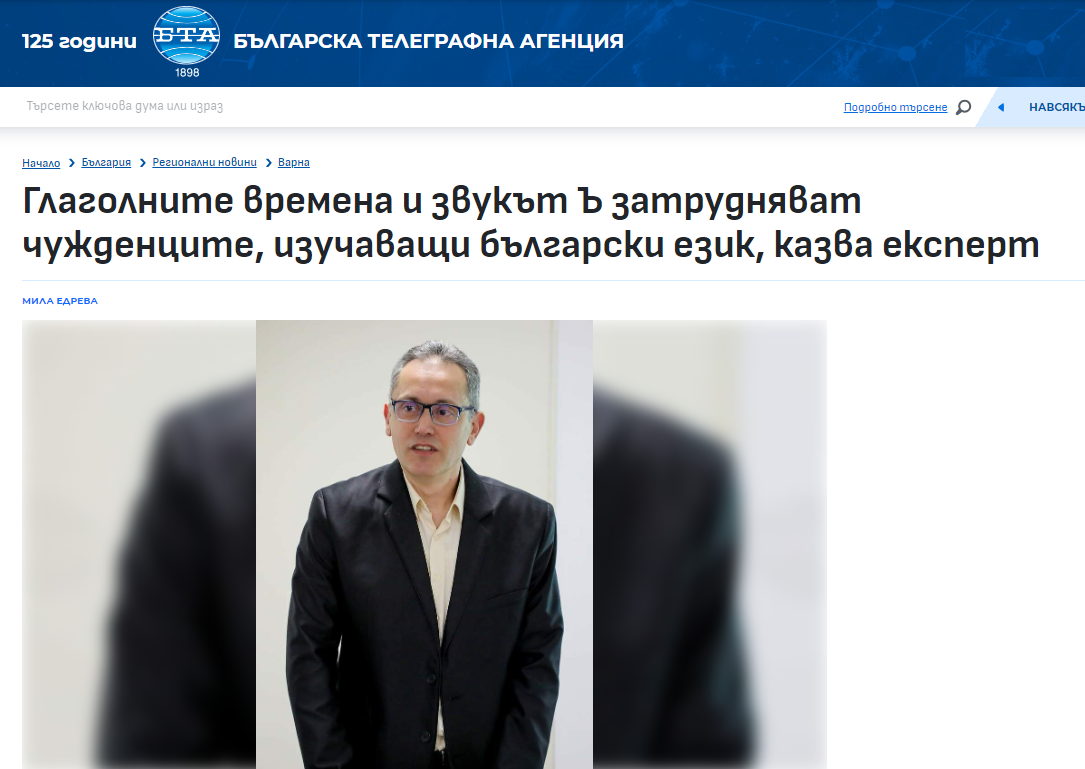Previous version of our website: old.vfu.bg/en
"THE VERB TENSES AND THE SOUND 'Ъ' MAKE IT DIFFICULT FOR FOREIGNERS STUDYING BULGARIAN LANGUAGE", SAYS THE EXPERT
12 January 2024

Verb tenses are one of the most serious difficulties encountered by foreigners learning Bulgarian. Especially in the initial stage of learning, the sound Ъ turns out to be an obstacle. This is what Assoc. Prof. Dimitar Marinov, who teaches Bulgarian to foreign students at Varna Free University, said in front of BTA. The university has a special course 'Bulgarian as a Foreign Language', which is studied in a preparatory year for language and specialized training.
"Among the main difficulties in mastering our language in the field of grammar are the articles put at the end of the nouns, the use of short forms of personal and possessive pronouns, as well as reflexive forms of verbs. According to the expert, foreigners also have difficulty with the joint use of verb tenses, as well as with the use of some of the prepositions and conjunctions. At the syntactic level, the problems are mainly related to the use of some impersonal sentence constructions", added Marinov. According to him, the difficulties for foreigners mainly come from the pronunciation of the sound 'Ъ', especially at the beginning of their studies, as well as from the correct placement of the stress. In the field of spelling, the difficulties are mostly in spelling words with dropping and inserting of 'Ъ' and 'Е', said Marinov. According to him, within the framework of the training, some of the foreigners are very worried about mastering the verb system of the Bulgarian language. They are especially bothered by complex verb tenses (for example, past preliminary tense), as well as reported verb forms.
"At the very beginning of the training, the students are aware that they will most likely encounter difficulties with learning our language", said Marinov. According to him, the reason is that already at the first lesson, everyone receives an "Information package for the student", in which the main highlights of the content of the course are presented. Thus, the course participants realize at a very early stage that the Bulgarian language is not easy to master, pointed out Marinov.
The expert also said that traditionally the speakers of Slavic languages are the easiest to deal with. The explanation is that there are quite a few common features between them and Bulgarian, mainly at the grammatical and lexical level. Practice shows that it is most difficult for Africans to master our language. Marinov clarified that this is still too relative, since everything depends on the individual characteristics of the learner.
"The preparatory year for language and specialized training of foreigners lasts for 9 months", said Marinov. He emphasized that the young people are actually learning official Bulgarian, without its system of dialects, and the aim is to gain communicative skills in a wide range of familiar and predictable situations.
When asked if, as a teacher, he has any concerns about the future of our language, given that many of the young people already speak some mixture of English and Bulgarian, Marinov pointed out that this problem has been relevant since the Renaissance. It is a normal process for words of foreign origin to enter the lexical composition of Bulgarian, but in recent years the use of foreign words has increased, the expert pointed out. According to him, in many cases words from other, no longer so fashionable foreign languages have been displaced by English words. "This serious worship of the young to foreigners (and not to loanwords) is unnecessary and harmful to our language. In this way, the Bulgarian speech is impoverished and barbarized," Marinov believes. According to him, this has a negative impact on the written culture of a large part of young people. Spelling changes are probably needed, but the society itself does not feel the need (or interest) for them at the moment, at most we can agree to some cosmetic corrections, which will actually be far from the main shortcomings of our current spelling, summarized the lecturer.

